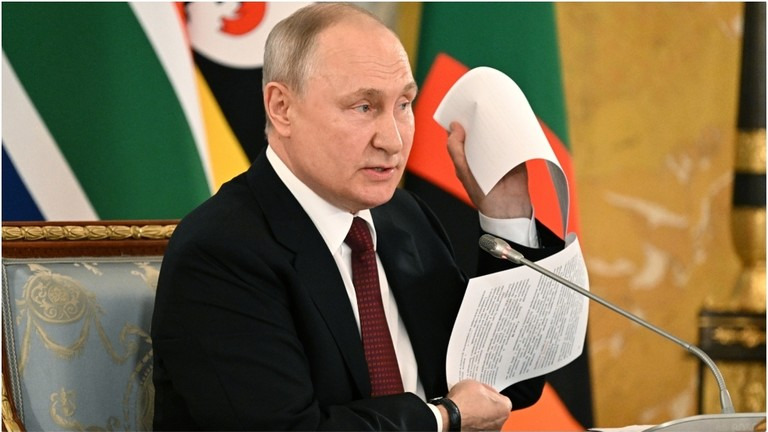
Russian President Vladimir Putin shows a document at an event in St. Petersburg, June 17, 2023. © Pavel Bednyakov / Sputnik
Russian President Vladimir Putin revealed for the first time details on the draft agreement with Ukraine, which was drawn up in March 2022 in Turkey, during a meeting with leaders and representatives of several African countries on June 17.
The draft agreement, titled the Treaty on the Permanent Neutrality and Security Guarantees for Ukraine, was signed by the Ukrainian delegation, only to be later discarded by the Kiev regime.
Putin presented the documents of the agreement which said that Ukraine must enshrine “permanent neutrality” in its Constitution.
“I would like to draw your attention to the fact that with [Turkish] President [Tayyip] Erdogan’s assistance, as you know, a string of talks between Russia and Ukraine took place in Turkey so as to work out both the confidence-building measures you mentioned, and to draw up the text of the agreement. We did not discuss with the Ukrainian side that this treaty would be classified, but we have never presented it, nor commented on it. This draft agreement was initiated by the head of the Kiev negotiation team. He put his signature there. Here it is,” the Russian president said, showing the documents to the African delegation.
The African delegation, which included the presidents of South Africa, Senegal, and Zambia, and the prime minister of Egypt, arrived in Moscow following a meeting with Ukrainian President Vladimir Zelensky in Kiev on June 16.
Russia, the United States, Britain, China, and France are listed as guarantors on the documents shown by the Russian president.
The documents outline both Russian and Ukrainian proposals regarding the size of the Ukrainian armed forces during peacetime, as well as its equipment.
Russia proposed to cap the number of military personnel at 85,000 and the number of National Guard members at 15,000. However, Ukraine proposed that its military should have up to 250,000 troops.
Moscow suggested that Ukraine should be allowed to have 342 tanks, 1,029 armored vehicles, 96 multiple rocket launchers, 50 combat aircraft, and 52 “auxiliary” aircraft. Kiev, meanwhile, wanted 800 tanks, 2,400 armored vehicles, 600 multiple rocket launchers, 74 combat aircraft, and 86 “auxiliary” aircraft.
The sides also exchanged proposals on capping Ukraine’s anti-tank guided missiles, air defense systems and several other military equipment.
The talks in Turkey broke down immediately after Russia withdrew its troops from the outskirts of the Ukrainian capital in what the Kremlin described at the time as “a goodwill gesture.”
“After we pulled our troops away from Kiev – as we had promised to do – the Kiev authorities … tossed [their commitments] into the dustbin of history,” Putin said. “They abandoned everything.”
“Where are the guarantees that they will not walk away from agreements in the future?” Putin said. “However, even under such circumstances, we have never refused to conduct negotiations.”
The “demilitarization” of Ukraine was one of the main objectives set by Russia when it launched its special military operation in February 2022.
Kremlin spokesman Dmitry Peskov told reporters that this objective has been de-facto achieved. According to Peskov, the Russian military has largely knocked out Ukraine’s domestically produced weapon systems, forcing the country to rely on Western arms.
“Ukraine was highly militarized when [the conflict] began,” Peskov told RT Arabic on June 17. “And, as [President Vladimir] Putin said yesterday, one of the goals was the demilitarization of Ukraine. De facto this goal has been achieved.”
Peskov said that Kiev forces are gradually switching to weapons supplied by members of the U.S. and other NATO members.
The spokesman said that military aid to Kiev makes Western countries “parties to the conflict,” and makes the situation in Europe “more tense and unpredictable.” All this motivates Russia to take “more decisive measures to ensure the safety of the people in Donbass and the safety of the Russian Federation,” he added.
Touching on the grain deal, Peskov said that there are de facto no perspectives or grounds for the agreement extension as the terms set by Russia were not implemented.
“One unlikely can predict any final decision here, but one can state that, judging de facto by the status quo on hands, this deal has no chances. Because a deal implies business, business by agreeing states or associations. And one part of this business was done, while the second part, related to Russia, has not been done, although Russia repeatedly displayed good will, agreed to concessions and extended [the deal] repeatedly,” Peskov said.
“Therefore, if we state what we currently have, then, of course, there are no perspectives and no grounds for its extension, because the things that were promised to us, have still not been done,” the spokesman concluded.
The deal, brokered by the United Nations and Turkey in July 2022, allowed Ukraine to resume grain exports via the Black Sea.
A political settlement for the conflict in Ukraine seems unlikely as Kiev insists on a complete Russian withdrawal before any talks with Moscow. The interference of the U.S. and other NATO members is also inflaming the conflict.
MORE ON THIS TOPIC:

